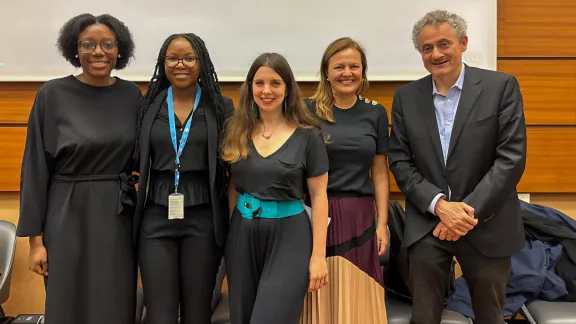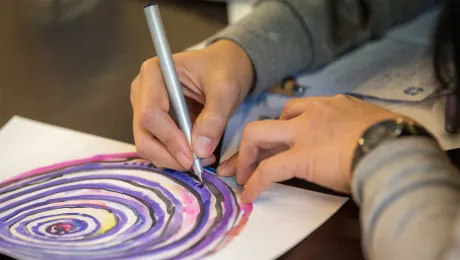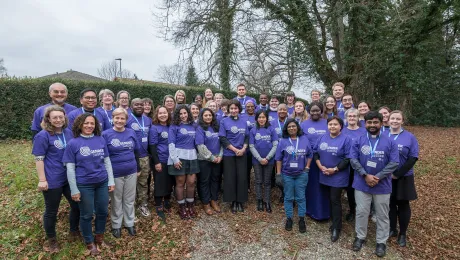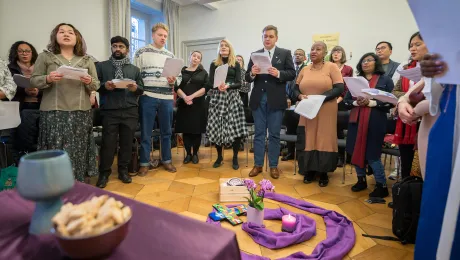
Panelists with moderator Sikhonzile Ndlovu, LWF’s Senior Advocacy Officer for Gender Justice, at the 20 June event on the gendered impacts of violent conflict and war. Photo: WCC/E. Lehoux
An event at the UN Human Rights Council reiterates the vital role of women in conflict prevention and peacemaking
(LWI) - How to protect women and girls in times of war, while simultaneously increasing their presence in peacemaking and conflict resolution. These challenges were at the heart of discussions at an event organized by the Lutheran World Federation (LWF), together with ecumenical partners and UN agencies, during the ongoing Human Rights Council meeting in Geneva.
‘Exploring the gendered impacts of violent conflict and war’ was the title of the 20 June side event, sponsored by the LWF in partnership with the World Council of Churches (WCC), ACT Alliance and the Young Women’s Christian Association (YWCA). The goal was to showcase strategies to protect women’s human rights, underlining the interconnectedness between gender justice and the search for a more peaceful world.
Adriana Quinones, Deputy Head of UN Women Geneva Office and Head of Human Rights and Development highlighted the devastating and disproportionate impact of war on women and girls, including killings, sexual slavery, an increase in child marriages and reduced access to vital services. Quinones also noted that by end of 2023, the UN reported the highest number of active violent conflicts since World War Two and warned that “rape continues to be used as a weapon of war.”
There is overwhelming evidence to show that greater inclusion of women in peace making processes leads to more effective negotiations and better outcomes.
Agnieszka Fal-Dutra Santos, research coordinator at Geneva’s Graduate Institute for Development and International Studies
“Protecting women and girls’ human rights during times of war and violent conflict cannot be over-emphasized, since they are so disproportionately affected,” said Sikhonzile Ndlovu, LWF’s Senior Advocacy Officer for Gender Justice, who moderated the event. “With conflict and war come the associated risks of increased sexual and gender-based violence, human trafficking, loss of jobs, loss of economic opportunities, reduced access to education and reproductive health services.”
A landmark U.N. Security Council resolution from October 2000 calls for special measures to protect women and girls in armed conflict and affirms the important role of women in prevention, peace negotiations and peacebuilding. Yet according to the U.S.-based Council on Foreign Relations, in 2022, women represented only 16 percent of negotiators in active peace processes that were led or co-led by the United Nations, a decline from 23 percent in 2020. No women at all were included in negotiating teams dealing with the conflicts in Ethiopia, Myanmar, the Balkans, Sudan or Yemen.
There is “overwhelming evidence to show that greater inclusion” of women in peace making processes leads to “more effective negotiations and better outcomes,” said Agnieszka Fal-Dutra Santos, a research coordinator at Geneva’s Graduate Institute for Development and International Studies. Civil society research has shown how women’s rights organizations have helped to build peace in their communities in a variety of ways, she said.
Building a culture of peace
These range from influencing official peace negotiations (for example in Colombia, the Philippines, South Sudan), through organizing socio-economic programs and support for veterans or victims of conflict, to promoting a culture of peace and implementing the texts of peace agreements in their communities. “Women-led spaces become safe spaces, [which] can contribute to trauma-healing, help to lower armed group recruitment rates and build a culture of peace,” she insisted.
Rev. Yoleni Rabelais, who works in the WCC’s Peacebuilding in the Middle East department, underlined the vital role that faith actors can play, from first responders in situations of war and conflict, advocating for human rights protection and the inclusion of women in peace processes. Faith actors “promote social cohesion and tolerance, economic stability and community resilience through development programs,” she said. “The faith community also encourages non-violent resolutions and reconciliation, playing a vital role in peacebuilding and dialogue efforts.”
Participants also called for greater resources to support women’s human rights defenders and civil society engaged in humanitarian support in conflict zones. Ingo Piegeler, head of the Inter Agency and Cooperation unit at the humanitarian response division of the UN Population Fund concluded: “There is a need for a robust protection strategy for women and girls during war. It is our collective responsibility to improve programming” to achieve this goal.


